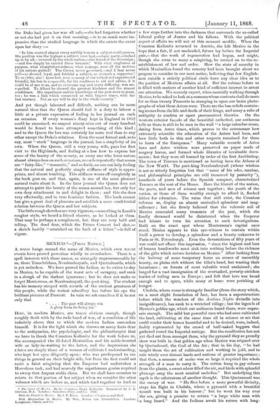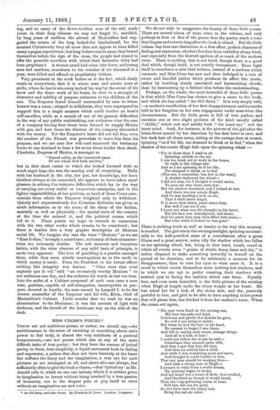.MEXICO.*—[FinsT No - ricE.] A HALO hangs around the name of Mexico,
which even recent events have proved powerless wholly to overshadow. There is a spell inwoven with those names, so strangely unpronounceable by us, those Tenochtitlans, Nezalmalcoyatls, and Quetzalcoatls, which is yet unbroken. We have proved the Indian, as lie exists to-day in Mexico, to be capable of the worst acts of savagery, and sunk in a slough of the darkest ignorance ; but he does not make us forget Montezuma, or Nezahualcoyatl, the poet-king. The student has his memory steeped with records of the ancient greatness of this people, while the veriest schoolboy has before his eye the brilliant pictures of Prescott. In vain we ask ourselves if it be not only that
" . . . . The past will always win A glory from its being far."
Here, in modern Mexico, are traces obvious enough, though roughly dealt with by the rude hand of war, of a condition of life infinitely above that to which the modern Indian surrenders himself. It is for the light which she throws on many facts dear to the antiquarian, the psychologist, and the philanthropist that we have to thank the Countess Kollonitz for the work before us. She accompanied the ill-fated Maximilian and his noble-hearted wife as lady-in-waiting to the latter, and the impressions she relates are simply those of a woman of cultivate 1 understanding, who kept her eyes diligently open ; who was predisposed to see things in general on their bright side, but from the first could not mist a faint misgiving that the Emperor had undertaken a Herculean task, and had scarcely the superhuman genius required to sweep that Augean stable clean. But we shall have occasion to return to that portion of her subject when we consider the other volumes which are before us, and which tend together to lead us
* The Court of Neri,o. By the Countess Paula Kollonitz. Translated by J. E. 011ivant, M.A. London: Saunders, Otley. and Co. 1567.
With the French in Mexico. By J. F. Elton. London : Chapman and Hall.
With Maximilian in Mexico. By Max., Baron von Alvensleben. London: Longmans, Green, and Co.
a few steps farther into the darkness that surrounds the so-called Liberal policy of Juarez and his fellows. With the political aspect of affairs we will not at this moment meddle. When the Countess Kollonitz returned to Austria, she left Mexico in the hope that a fair, if not unclouded, future lay before the Imperial pair,—that the work of regeneration had begun, and might, though she owns to many a misgiving, be carried on to the re-
establishment of law and order. How the state of anarchy in which Maximilian found the country had been brought about we propose to consider in our next notice, believing that few English- men outside a strictly political circle have any clear idea as to the position of Mexican affairs at all. But the volume before us is filled with matters of another kind of sufficient interest to arrest our attention. We scarcely expect, when mentally walking through Mexico, to be asked to look at a museum whose contents shall do more for us than twenty Prescotts in stamping in upon our brain photo- graphs of what these Aztecs were. There are the bas-reliefs contain- ing scenes from the life and deeds of their kings, and many a relic of antiquity to confirm or upset preconceived theories. On the western exterior fac:ade of the beautiful cathedral, our authoress tells us there is still to be seen in the wall "a large calendar-stone, dating from Aztec times, which proves to the astronomer how extremely scientific the education of the Aztecs had been, and how little both in this and other respects remained for them to learn of the Europeans." Many valuable records of Aztec laws and Aztec -wisdom were preserved on paper made of maguey leaves, and formed whole libraries of invaluable docu- ments; but they were all burned by order of the first Archbishop. The town of Tezcuco is mentioned as having been the Athens of the New World. The poet-king Nezahualcoyatl (whose wisdom is not so utterly forgotten but that "some of his odes, maxims, and philosophical principles are still treasured by posterity "), hundreds of years before the Spanish conquest, characterized Tezcuco as the seat of the Muses. Here the literati of the nation, the poets, and men of science met together ; the youth of the nation, or those of them wealthy enough to afford it, flocked hither for education. The ruins that still exist, the Countess informs us, display an almost unrivalled splendour and mag- nificence; but she firmly believed that the volcanic soil of Mexico concealed many treasures of the past, which she fondly dreamed would be disinterred when the Emperor had leisure to turn his attention to such investigations. Built on the exact spot where Montezuma's capital once stood, Mexico appears to this eye-witness to contain within itself a power to develop .a splendour and a beauty unknown to Paris or St. Petersburgh. Even the devastations of fifty years of war could not efface this impression, "since the highest and best of human handiworks must sink into nothing before the richness of the gifts which nature lavishes on Mexico." After looking from the balcony of some temporary home on scenes of unearthly beauty, on plains rich without the tiller's hand, but wasting their luxuriance ; on forests of most valuable wood unclaimed ; she longed for a vast immigration of the overtasked, poverty-stricken hordes of toiling men in Eurcpe ; and felt that here was bread enough and to spare, while many at home were perishing of hunger.
Cholula, whose name is strangely familiar (from the story which, on a most slight foundation of fact, has been a superstructure before which the wonders of the Arabian Nights dwindle into insignificance), has sunk to a wretched village ; but the legends of Mexico's golden age, which our authoress heard there, were unpro- saic enough. The mild but powerful race who had once cultivated the land, cultivating at the same time all in science or art that could render their homes beautiful and to be desired, were, indeed, feebly represented by the crowd of half-naked beggars that gathered round the Imperial cortege. But the recollection has not yet died out from amongst them, why the pyramid they so proudly show was built in that golden age when Mexico was reigned over by Quetzalcoatl, the God of the Air ; that in his day, "he had taught them the art of cultivation and working in gold, and to rule wisely over distant lands and nations of greater importance ; that then, a measure of maize was so large it required the whole strength of a man to carry it. The cotton hung in gay colours from the plants, a sweet odour filled the air, and birds with splendid plumage sang the most musical melodies." But underlying this myth is the substratum of another thought. This Quetzacoatl was the enemy of war. "He flies before a more powerful divinity, stays his flight in Cholula, where a pyramid with a beautiful teocali was built in his honour ;" but he went his way over the sea, giving a promise to return "a large white man with a long beard." And the Indians await his return with long-
jug, and to many of the down-trodden sons of the soil, made (even in their deep vileness we may not forget it), moulded, by long years of serfdom the advent of Maximilian had sug- gested the return of the long looked-for Quelzalcoatl, for the nominal Christianity they all avow does not appear to have killed many a pagan superstition; but long before even in name they bowed themselves before the sign of the cross, the people had ceased to offer the peaceful sacrifices with which their favourite deity had been propitiated. A sterner creed had come into force, and young men and maidens, sometimes to the number of six thousand in a year, were killed and offered as propitiatory victims.
Very prominent in the work before us is the fact, which dimly meets us everywhere, that it is where man and nature seem at strife, where he has to win every inch of his way by the sweat of his brow and the fierce work of his brain, he rises to a strength of character and nobility of purpose unknown to the children of the sun. The Emperor found himself surrounded by men to whom honour was a name ; steeped in selfishness, they were unprepared to support him in a single measure which could involve an hour's self-sacrifice, while as a sample of one of the general difficulties in the way of any pplic undertaking, our authoress cites the case of a company having four times been formed to supply Mexico with gas, and four times the director of the company absconded with the money. Yet the Emperor's heart did not fail him, even the-conduct of the French was powerless to move him from his purpose, and we are sure few will read unmoved the testimony borne to one destined to bear a lot seven times harder than death. Charlotte, Empress of Mexico, is amongst us
"Named softly, as the household name Of one whom God bath smitten,"
but in that short career to which she looked forward with so much eager hope she was the moving soul of everything. Daily with her husband in the city, her pen, her knowledge, her keen intellect always at his command, she appears to have taken equal pleasure in solving the intricate difficulties which lay in the way of carrying out every useful or benevolent enterprise, and in the lighter responsibilities of her position, as head of those Court cere- monials from which the Emperor delighted only to withdraw. Quietly and unpretentiously the Countess Kollonitz has given us much information as to the cause of the decay of the Indian, mentally as well as physically ; the special state of the country at the time she entered it, and the political causes which led to it. These points we hope to retouch in connection with the two other works which remain to be considered ; but there is besides this a very graphic description of Mexican social life We imagine she uses the term " Mexican " as we use "East Indian," to imply a mixed race ; and many of their character- istics are extremely similar. The soft manners and luxurious habits, with the utter absence of any solid basis of principle, is made very apparent. The love of gambling is a passion amongst them, while they seem utterly unscrupulous as to the mode in which money is made. From the President to the lowest officer nothing like integrity was known. " Chez nous rien n'est organise que le vol," said "an excessively worthy Mexican" to our authoress one day, and she endorses his words as but too true. Into the midst of a Cabinet composed of such men came a man wise, guileless, capable of self-abnegation, incorruptible in pur- pose, devoted in loyalty, the man named by Leopold I. to be the chosen counsellor of the Emperor and his wife, Elvin, chief of Maximilian's Cabinet. Little wonder that we read he was an abomination to the Mexicans ; it was the contact of light with darkness, and the breath of the hurricane was on the side of the dark.































 Previous page
Previous page